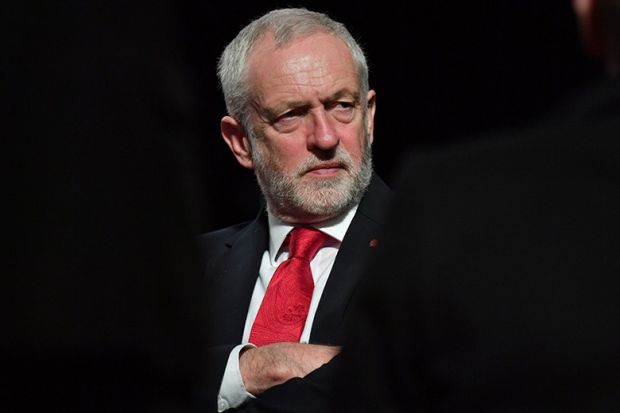High levels of graduate debt in England may soon deter many poorer students from attending university, Jeremy Corbyn has warned.
In a speech to the British Chambers of Commerce, the Labour leader said that the country could soon face a “shortage” of undergraduates because young people would be put off by graduate debts that will “last a lifetime”.
Highlighting an Institute for Fiscal Studies report published on 5 July that said poorer graduates face overall debts of £57,000 after leaving university, Mr Corbyn said that this debt burden “risk[s] deterring working-class students, meaning talent wasted and potential untapped”.
“Not everybody can access the Bank of Mum and Dad to go to university,” Mr Corbyn told representatives of business leaders on 6 July.
“Our plans for a high-skilled, high productivity economy rely on a large graduate workforce and that means no one should be discouraged from going to university because of debt."
Laying out plans to invest £5.6 billion in a “national education service” by increasing corporation tax to 26 per cent, Mr Corbyn said that it was unfair that graduates should be saddled with such high debts.
“We cannot go on with people getting £50,000 or £60,000 in debt,” he said, adding that “there will be a shortage of people going to university because they cannot countenance the idea of that much debt”.
In his address, Mr Corbyn highlighted Labour’s manifesto promise to scrap tuition fees at a cost of £11 billion a year, which is credited with the surge in Labour’s support in June’s general election. Labour, said Mr Corbyn, was “not just an opposition but a government-in-waiting”.
The popularity of this promise has prompted one Cabinet minister, Damian Green, to suggest the need for a “national debate” about tuition fees, saying that student debt was a “huge issue” for the Conservative government. Jo Johnson, the universities minister, has defended the student loans system as “fair”, but has refused to be drawn on whether loan interest rates, which will rise to 6.1 per cent in September, will be reviewed.
Speaking to Times Higher Education, Mr Corbyn said that he believed a national debate about tuition fees would recognise that they “act as a deterrent”.
Asked why he felt the current student finance system was putting off students despite near-record full-time undergraduate enrolments in 2016-17, he said: “Look at the number who are dropping out and their income levels.
“Look at the hardship that many families are going through, having to remortgage their homes to pay for their [children’s] education – somewhere along the line these debts start to stack up.”
Mr Corbyn’s comments, however, were dismissed by Vince Cable, the Liberal Democrat MP for Twickenham, who was in charge of higher education as business secretary from 2010 to 2015.
“What the leader of the opposition is proposing is incredibly popular, but it is foolish and dangerous,” Mr Cable told business leaders. “The problem is how the hell else do you fund universities, which are expensive institutions to run,” he said, adding that the country is in a “dangerous place about funding”.
Scrapping university tuition fees was also unfair on the 60 per cent of young people who do not attend higher education, Mr Cable added.
“There is an enormous clamour to provide big, big subsidies to relieve a well-off part of the population who go to university and it will be at the expense of the 60 per cent who do not,” he said.
Register to continue
Why register?
- Registration is free and only takes a moment
- Once registered, you can read 3 articles a month
- Sign up for our newsletter
Subscribe
Or subscribe for unlimited access to:
- Unlimited access to news, views, insights & reviews
- Digital editions
- Digital access to THE’s university and college rankings analysis
Already registered or a current subscriber? Login








